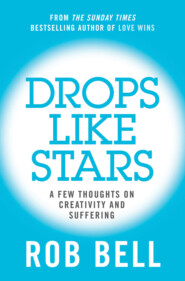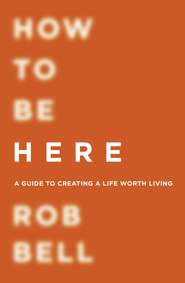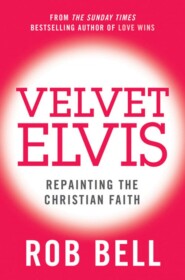По всем вопросам обращайтесь на: info@litportal.ru
(©) 2003-2024.
✖
The ZimZum of Love: A New Way of Understanding Marriage
Автор
Год написания книги
2018
Настройки чтения
Размер шрифта
Высота строк
Поля
R: Or unpidgeonholeable—
K: Yes?
R: —or fog index or history of fishes …
K:In the last page of endnotes in his book What We Talk About When We Talk About God Rob gives a list of words (#litres_trial_promo) and phrases and names for apparently no reason other than sheer enjoyment.
R: Like the word cummerbund.
K: Cummerbund?
R: The thing some men for unknown reasons choose to wear around their midsections at weddings. It’s a Persian word, from the word kamar, which means waist—it’s actually a kamar band.
K: I rest my case. Which is why it didn’t surprise me when he started using the word zimzum.
R:Zimzum (originally tzimtzum) is a Hebrew word used in the rabbinic tradition to talk about the creation of the world (#litres_trial_promo)—not in a scientific way but more like something somewhere between poetry and metaphysical speculation. Followers of this tradition began with the assumption that before there was anything, there was only God. The divine, they believed, was all that was. For something to exist other than God, then, God had to create space that wasn’t God. A bit esoteric, but stay with me. Their contention was that for something to exist that wasn’t God, God had to contract or withdraw from a certain space so that something else, something other than God, could exist and thrive in that space. And the word they used for this divine contraction is zimzum. God zimzums, so that everything we know to be everything can exist and thrive.
We loved this word zimzum, and we were struck with how well it describes what happens when you’re married. The more we talked about it, the more we found ourselves bending and stretching this word, making it our own.
You meet this person, you fall in love, and you zimzum—creating space for them to thrive while they’re doing the same for you. This zimzuming unleashes energy and creates space that didn’t exist before, generating the flow that is the lifeblood of marriage.
To illustrate how this flow works, we’ll explore four aspects of this space, space that is responsive, dynamic, exclusive, and sacred.
CHAPTER 2 (#ulink_2c10672b-1c4f-5b4e-b15c-a8a09d8e7548)
RESPONSIVE (#ulink_2c10672b-1c4f-5b4e-b15c-a8a09d8e7548)
The space between you is extremely responsive.
We’ve drawn this image for responsive as a large, bold arrow toward the other person because everything you do and everything you are affects the flow between the two of you. It’s like a finely tuned radar, or the needle on a record player, the slightest notes and sounds amplified along with every bit of dust or the smallest scratch.
People often aren’t aware of just how responsive the space between them is. It matters what you say, it matters what you do, it matters how you think about this other person, it matters how you think about yourself. All of it, good and bad, shapes the flow between you.
To keep this energy field full of life and vitality, you intentionally act for their well-being. This movement is the foundation of your life together. (#litres_trial_promo) It’s what everything rests on. It’s the engine, the catalyst, the energy that keeps the space between you humming. It’s what you return to again and again.
The arrow moves from you to them while another comes back to you. That’s how the flow starts, that’s how it’s sustained, and that’s how you get it going again when it’s blocked. You’re looking out for their best while they’re looking out for yours.
K: I don’t really enjoy talking on the phone. I’ll blame it on being an introvert. (#litres_trial_promo) I much prefer face-to-face conversations. Transitions like ending a phone call are hard for me, and that combined with an overdeveloped sense of empathy can leave me feeling stuck for a painfully long time. Once in a while I’ll have to return a difficult call—something socially awkward or a call in which I have to say no to somebody—and it will haunt me all day. I tell you this because one day Rob brought home a jacket he’d just bought.
R: I remember that jacket. I loved that jacket. The salesman loved that jacket. Other people in the store loved that jacket.
K: And he put it on for me, and I immediately said No way.
R: She did. Not the slightest doubt. She just shut that jacket down.
K: It had a weird curve in the stitching on the back that just wasn’t right. It looked like a woman’s jacket.
R: You’re killing me right now.
K: No, I was saving you.
R: I’ve learned over time to trust her instincts; so I was fine taking it back. Except for one thing: I couldn’t face the salesman. He had been so excited about that jacket. This pains me to admit, but I couldn’t take that jacket back because I couldn’t face that salesman. How pathetic is that? So in the heat of the moment, desperate, I offered Kristen a deal.
K: Actually, I offered the deal: I’ll take back the jacket for you if you’ll do a hundred awkward phone calls for me.
R: I took that deal so fast. I still have something like ninety-six to go.
We realize this story is ridiculous.
K: I would have taken that jacket back for him without THE DEAL.
R: And I’ll make an awkward phone call for her anytime.
But we tell this story because there’s a back and forth, a give and take that happens when you zimzum.
You ask, What do you want? What do you need?
They tell you.
They ask you the same questions.
You answer.
They listen.
You talk about it.
You do things for each other.
You make deals, and then you laugh about how absurd it is to make deals because you would have done it anyway.
The arrows take you toward each other, creating a sense of momentum as the energy circulates in the space between you.
K: I was traveling in Europe a number of years ago and spent a few days with a newly married couple from the States who had moved there to work together. At one point I was having a meal with the wife and asked her what she saw herself doing in five years. I was surprised with her response, because she talked about living on a different continent, pursuing a degree in a field totally unrelated to the work they were currently doing. Because I had interacted with her husband before this and had heard some of his hopes and plans, I had the growing impression that they hadn’t talked about any of this with each other. They seemed to have lost the glue, the spark, the fire that brought them together in the first place, and they were headed in different directions.
To act, you first have to know.
You have to know what it looks like for them to thrive; you have to be aware of their goals and dreams; you have to know what they want and what they need and what makes them feel secure and what makes them happy and fulfilled.
It’s amazing how much can change between you when you ask, What do you need?
R: People used to hold up signs at football games that read “JOHN 3:16”—remember those? (The person holding the sign up was usually sitting next to the dude in the rainbow wig.) Those signs were referring to a verse in the Bible about how God loves the world so much that God sent God’s son. The big word in that verse is, of course, that. Divine love is the kind of love that does something.
K: It’s one thing to be in love; it’s another to act because of love. Love is a noun—a feeling you have—and it’s also a verb, something you do.
The space between you is highly responsive because it’s generative space—whatever you put into it multiplies exponentially.
Have you ever had an argument or a fight or an epic blowup and then later, when the dust settled and you talked about it, you realized that the whole thing started with something small?











